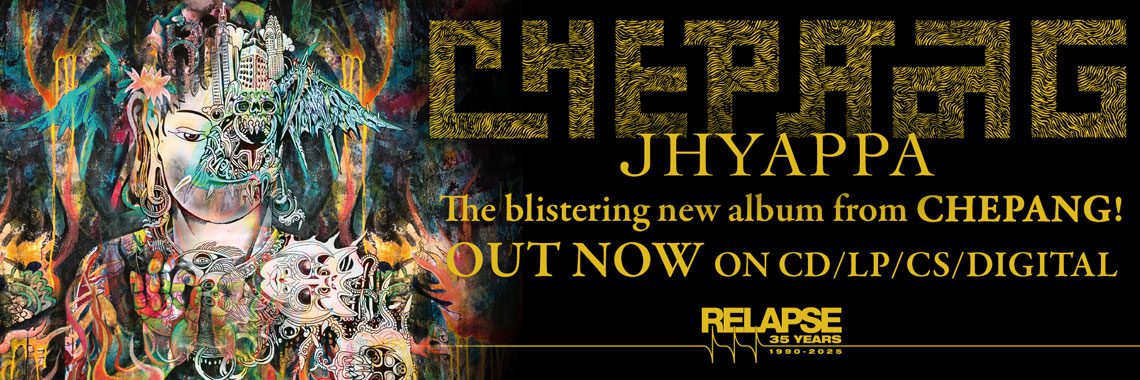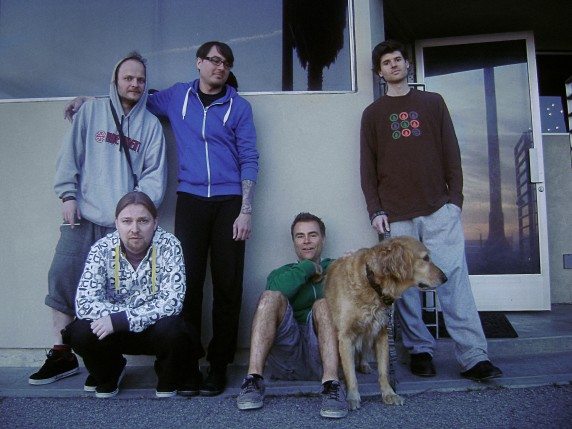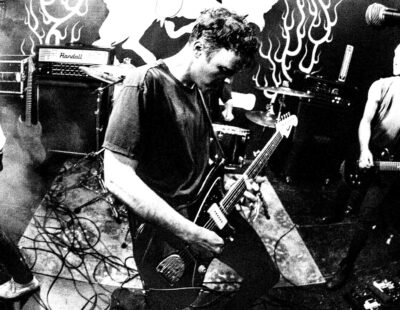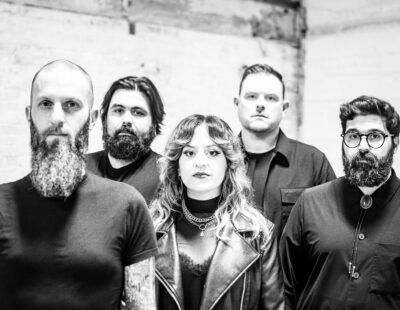To paraphrase my favorite comic, Mitch Hedberg (R.I.P.), Semantik Punk is a Polish experimental punk outfit that people will either love or hate, or think they’re okay. They’re hardcore enough to sound like a badly scratched Converge or Dillinger Escape Plan CD that won’t stop skipping to random spots on the disc; they’re rock enough to focus on writing groove-able songs; they’re punk enough to eschew all sense of ego and even allow their shifting band name to be part of the performance; and they’re Sigur Rós enough to write lyrics in a nonsensical version of a language rooted in their own heritage.
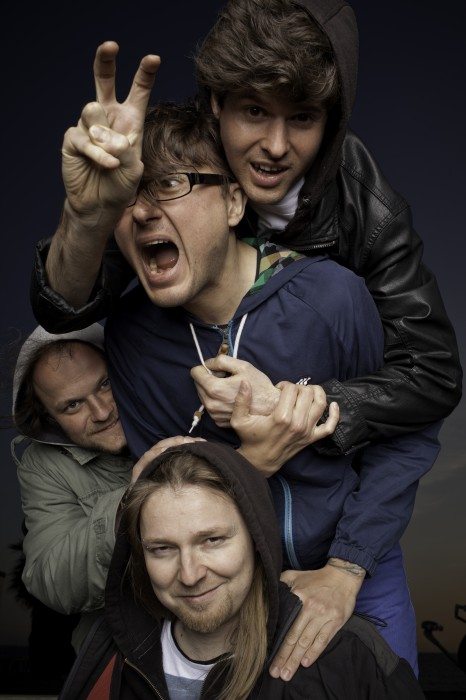
If you’ve been reading Decibel for a long time (since the teen issues… oh, the teen issues), and if you’ve obsessively re-read Black Label Deb Ball inserts in the reviews section with the intent to memorize every vltra-kvlt underground word, you might recognize the name Moja Adrenalina, which was Semantik Punk’s former name when they released a record called nietoleruje-bije. Late last year they got in touch with producer Ross Robinson (famed producer of Sepultura’s Roots and Slipknot’s Iowa, among a slew of others) and knuckled down on 8 songs and a half-hour drone shimmer, a collection they called abcdefghijklmnoprstuwxyz.
Decibel caught up with Mr. Robinson and asked him about his experience with the band. Among the various things he didn’t say, what follows is what he did say:
In general, how are you running across bands you’d like to work with these days? More specifically, how did you get hooked up with Semantik Punk?
Well, the guys contacted me online. I’m easy to find. simply message me through twitter or Facebook. The hookup was from a natural respect for each others expression. No mystery..
How much time did you spend working with the band on the record?
Enough time to slam it without getting too insane about little details that don’t matter.
Were there any special/strange situations to deal with for this record as compared to other bands/albums you’ve worked on?
Just that Rafal was a true raw vegan chef driving my runner to the ground getting supplies for his meals. He quit. I thought it was an amazing test for the runner to see who he was. We all got to see something wild.
How do peculiarities in the personalities of the band affect the way your approach your work with them?
I am here to get it done with huge intensity. If people aren’t at the level, I’ll go around them until they can catch up. It’s great with dudes wanting to work with an uplifting gratitude to be here, but a lot of times my job is to be aware and just listen… People want to be heard when times aren’t easy.
What’s your impression of the outcome of the Semantik Punk record?
My impression is that they feel together, not separately tracked. I can feel the ghost flying through the air…
It took a lot of guys to contact and sale me to do this. Most people believe it’s too expensive, or that I won’t like it. They are a great polish experience and so grateful the reached out. Good dudes and good friends – great band…
————
Great band, indeed. [This is Decibel speaking again, in case the meager dashes above didn’t tip you off.] And we’re getting to premiere a new video from the record that does a great job showing off the wacky sense of humor and serious sense of musicianship these guys bring to the table. Enjoy the video and its attempt to glean meaning from meaningless lyrics (more on that below), and then enjoy it eight or nine more times while you read the interview with the band. And you can catch the full album at Bandcamp, too!
How did Semantik Punk start?
I’m not sure how to explain it as it seems like it happened in reverse. Only now, when the album has been recorded and we began to name and sort through what happened, did it all become organized a bit. But earlier, at the creation stage, we didn’t know who we were or what our name was. We were flying blind, not knowing where we were going or why. During most of that time, what you can now hear on the album did not resemble music at all, did not seem to have any core concept, and it seemed like we were going to keep writing forever. Since 1999 we’ve been playing with the same lineup under the name Moja Adrenalina; this was our name on our 2004 debut album nietoleruje-bije, and this was our name while writing music for our second (as it turned out) 2012 debut abcdefghijklmnoprstuwxyz. The name Semantik Punk emerged at the very end, already in the studio, when we really heard these songs recorded for the first time. In Poland, where throughout all those years we made a name for ourselves on more than just the underground scene, the music is accompanied with this extra dimension of our name change. The press has called this act a “punk performance on self-identity in information space”, “romantic and idealistic manifestation of independence from names and labeling” and “rebellious arrogance towards the market, media, and their constant need to place phenomena in time, space and language”. We like these quotes, but we don’t quite feel like the authors of it all. It would be more accurate to say we allowed it to happen. This process largely happened extraneously. That is how we can now say that we don’t feel like artists anymore. An artist is someone who says “I made this!”. This is not what Semantik Punk is. Semantik Punk is everything that’s not associated with art. That is why every “we wrote”, “created”, “invented”, “decided” or “we planned” (etc etc etc) in this interview should be read in inverted commas. Therefore, Semantik Punk started when we felt we were in inverted commas in relation to “our” music.
Is SP part of a local/regional scene, or do you see your band as separate from other Polish heavy music?
We are recognized in Poland and we consider ourselves a part of a small group of bands which very clearly are the avant-garde of what could be labeled as “Polish heavy music”. The beginnings of the scene are associated with the band Kinsky and its 1993 album Copula Mundi and the band Kobong with its ’95 debut and its way more experimental ’97 album Chmury Nie Bylo (The Cloud is Gone). What started with these albums was later developed by the bands Nyia, Neuma, Progrram, The False Theory of Nicolai Copernicus, Samo or Antigama. We toured with most of those bands, we are friends with all those dudes and we have a common sense of humor, which seems to be an important base for the music of this scene. Unfortunately, only Samo and Antigama are still active, all the other bands have since broken up. Those acts could be associated with the so-called “world-math-avant-freejazz-grind-noise-something-shit scene”, but most likely would be considered a sub-genre of this narrow genre, as they all have something in common that nobody else does. You know, just as the Norwegian black metal is a sub-genre of black metal. For me it’s surprising that those bands never made it out of Poland, as they would certainly make the world avant scene more random. There were guys such as Steeve Hurdle (RIP) of Gorguts/Negativa and Rennie Resmini (Starkweather) supporting and promoting those acts for years. Same to Alap Momin (Dälek) – Samo is probably his favorite. Shane Embury (Napalm Death) released Nyia’s last album on his Feto Records and Antigama was the choice of Relapse Records…but it never seemed the time for this music to really come out.
What music did you hear that got you excited about experimental heavy music?
You could say that our main inspiration for making “experimental music” were two Polish bands mentioned before: Kinsky and Kobong. However, at the stage when purely musical inspirations still mattered to us (in mid-1990s), these bands and their music seemed like the most natural thing. What influenced us the most was the way those bands experimented with harmonies and polyrhythms as well as with the language. But to consider us a strictly experimental heavy band would only be half true. We don’t really have any rules in our writing process except for one: no matter how weird are the forms that come out, they need to have a song-like swing and a dance component. It could be said that our tracks are regular songs, built using irregular rhythm, harmony and language structures. It may make them seem like alternative pieces, but anyone looking for good old song spirit is going to find it there. It appears that it is due to this song-like quality, this well-known and well-liked dramaturgy, that even though the analyzing mind is confused by the unpredictable form, the intuition perceives those tracks as order, something whole, something familiar, rooted in the history of rock & roll. For us, the ultimate songs were created by The Beatles, Ramones, Buzzcocks, The Smiths, The Cure, Depeche Mode, Faith No More or Glassjaw, to name a few, but most of all it was the ‘80s and ‘90s Polish pop-rock, punk, and new wave scene that influenced us.
Anyway, everything I just said refers to the beginnings of our music. It’s been a long time since music influences mattered to us. You could say that we ourselves are our main inspiration, but that also would only be partly true, because our greatest influence comes from the reduction of ourselves in the process of creation, and from looking into what’s left when we disappear.
What influenced the sound of the music and performances on abcdefghijklmnoprstuwxyz?
Let’s divide it into two parts: writing and recording. As far as the writing is concerned, we have always been making music by way of non-musical events. Something along the lines of “do something with yourself and see what comes out”. But because we ran out of all our ideas for ourselves while making our first album, during the writing of abcdefghijklmnoprstuwxyz we had no clue what to do with ourselves and we were acting with no plan, unconsciously. Now, when the album has been recorded, we are realizing and naming what happened, we’re coming to the conclusion that there were two processes which influenced our sound and performance: the reversal of the hierarchy of values and the sequence of stages during the creation of the message (understood as the sum total of music, words, cover art, title, band name, and the very act of changing the name), and the reduction of ourselves in the creative process. As far as I can tell, the normal course of events is this: you feel something within yourself, you are able to identify it and give it some kind of form, you feel that you can express it and hope that this message will be received and understood; you go through a sequence of actions in order to carry out each of these steps. When we set out to make abcdefghijklmnoprstuwxyz, we considered such a standard cause-and-effect sequence unlikely. We were unable to get in touch with whatever is inside us, felt that it cannot be expressed, and even if it is expressed – it will neither be received nor understood. In that instant, everything turned upside down, and so instead of having known from the start who we are and what we want to say, we only named ourselves now and are now trying to decipher the material that came from us. At the same time, we were rejecting everything associated with projecting ourselves into our music, with carrying out our ideas, intentions, plans. We replaced action, i.e. multiplication of self, with refraining from action, i.e. reduction of self. If we had given it any thought at all, the scope of this reduction could have seemed being utopian. The way it ended was that the first word of the album is “nic” (“nothing”), and the last, written but never even said in the recording, is “do pustki” (“to emptiness”). The scope of this reduction was established between these words. There is this old Taoist saying that if you take anything to an extreme, it will turn into an opposite of itself. And so, for a long time we were, very consistently and radically, walking the road of not knowing, reduction and reversal, and at about the stage of entering the studio to record the demo, it started to transform into its polar opposite – into consistency, awareness, and – as we call it – “ex post logic”. We were looking for raw sound, raw execution, we were recording live to analogue tape. Just then, we started seeing and following this “ex post logic” which revealed itself in the tracks, and which we felt did not come from us. At that moment, luckily, Ross Robinson and America appeared in our way. From the Polish perspective, the U.S. constitutes addition and multiplication. The momentum of our already recognized reduction collided with the opposite force which was Ross and his need to enrich and expand our sound. It is probably why our cooperation was so inspiringly difficult at times. We were possessed with the momentum of reduction and with following this “ex post logic”, which as something that did not originate in us, in our consciousness, we treated as something very precious and were very stubborn when it came to protecting it. Same time on many other levels we were very open and trusting, and we generally feel that the final outcome is the result of a very deep and creative compromise. Ross was definitely the element without which this album wouldn’t be complete. As for American standards he is very reduced, minimalistic. He’s also raw, core and very much into not knowing and stuff. At the recording stage, even though we used a lot of our gear and setups, he had huge impact on sound and performance. Our emotional and formal constructions could have collapsed if not for him. He did a lot of work with us at a personal, emotional level. He made us play wildly and violent. Thanks to him, everything is big, living and even more unpredictable. He’s like a supersensitive apparatus for choosing the most intense takes. And as far as inspiring performance goes, he’s irreplaceable. At its core, his work with us was about energy and being imperfect which was a counterpoint to our focus on structure and technique. He also suggested several crucial arrangement solutions, without which, for instance, the ending of “jest to A” (is this A) would not be able to support/handle the first part of this track. Similarly, “zza a” (from behind a) and “pstrokąty” (specktangles) definitely would have been too weak for the conclusion of the first part of the album. The extent and depth of our record’s happy ending are definitely his doing. It should be mentioned that Steve Evetts, who mixed the album, also did an amazing, brilliant job. Thanks to him everything has its place and has become an raw-organic-whole.
How did you decide to use the dialect for the album’s lyrics?
What we’re calling an ancient and nonexistent Slavic dialect is actually poetry written by our lead singer, Adam. Poetry based on rules which are, to us, mysterious. It is not a metaphor, it has no rhymes, meanings or substance in the sense of language or logic. For Poles, it is pretty incomprehensible at the linguistic level, but is instead felt at a deep, intuitive level. Adam balances on the edge of sound, meaning and meaninglessness. In music, these words shift further towards sound, i.e. something which apparently is more universal than language. Adam wrote these words and they were treated with gravitas and respect on account of their very existence. It’s a kind of an elementary and unconditional respect for being, whatever form it might manifest in. We simply perceived these poems as something that reaches this place within us, where language doesn’t exist. It was only later that we thought that perhaps it might work in a similar way for people from different cultural backgrounds. Now we know it does. The first proof of this was Ross, who speaks no Polish at all. He perceived these words/sounds beyond the language and mind. It works similarly in Europe and China. It turned out that deep down we are pacifists who would like to see people understand one another at some higher level, beyond language, and our music and lyrics are, in fact, a wave of love for the world. In this respect, we could be considered representatives of Class-B New Age Music. (laughter!) Let me tell you about the recent surprise that hit us when we tried to translate these poems online. Everyone who ever used an automated online translator knows that the translation of even the simplest sentences usually turns out idiotic. In the case of our poems, it works the opposite way. They turn out great and amazing. Having no meaning or substance to begin with, they lose nothing. Instead, they become enriched with some component which is mysterious but very contemporary for culture and beauty of modern civilization. Our favorite is Bing – it’s definitely the best. The translated lyrics in the “jest to A” video – is this A – came from Bing. They owe us a shitload of money for this discovery! (laughter)
Why did you choose to title your album with the alphabet?
To us, the alphabet is more than just a collection of letters, it is also a recognizable shape. You don’t need to make sure there are no letters missing [No letters missing? Hmmm…] to know what it is. It’s something between language and a meaningless symbol. Our music and lyrics are a result of balancing on this narrow and apparently illusory edge. It’s a very simple, minimalist message. It is something that emerges when you’re not planning on saying anything in particular. You could say that our band is a generator of meaningless symbols, or of semantically empty language. I mentioned that we “wrote” this album only half-consciously, but now, after the fact, we see it’s something of a metaphor. A metaphor of people’s attempts at using words to describe themselves and the world, at giving them meaning. When we recognized this metaphor, we realized that we seem to perceive reality as something so thick and saturated with dynamic form that trying to assign meaning to it using something as fleeting, limited and static as words ends up being just scraps of meanings, floating on an ocean of possibilities, itself iridescent and sparkling with every possible shade, quality and structure. To us, however, this “failure of the scream of inexpressible” is somehow also beautiful and moving. The shape of abcdefghijklmnoprstuwxyz has something of this unspeakable / inexpressible / unutterable quality. It will be recognized by nearly everyone in the world, and nearly nobody, when asked, will be able to identify its meaning. It is a symbol endowed with a power which is unifying at a more universal level. Its the power which unifies people in common recognition and common lack of need to assign meaning. It is a reversal of what language and symbols are today.
How did you get hooked up with Ross Robinson?
I’ve already mentioned that we are huge fans of songs, and that – contrary to what it seems – there are plenty of song-like elements in our music. In our opinion, the album Everything You Ever Wanted to Know About Silence by Glassjaw, which was produced by Ross and mixed by Steve, is the crowning achievement when it comes to songs in post-hardcore era and we love it dearly. I don’t know why I remembered an interview from 10 years ago, in which somebody of Glassjaw said that Ross wasn’t really interested in demos – he preferred to come to a rehearsal and then decide whether he wants to work with the band. Somehow I remembered it when we were thinking about recording our album and we sent him a video recording of our rehearsal via Facebook… Three days later we got a reply. That’s how it started. I think another reason why we chose Ross and Steve was the fact that they made The Cure album, and the fact that Steve was a producer for The Dillinger Escape Plan. We thought that the scope of their interests and musical experiences, as well as their sensitivity and taste to different aspects of our music, would lead to something nice and pretty (laughs!).
What short term or long term goals do you have for Semantik Punk and its musical direction?
We are working on releasing our album in US and worldwide. For the time being, it’s available in Poland. In June, Noise Asia is going to release it in China and Hong Kong. We’re going there on tour this summer, together with our publisher and friend Dickson Dee, laptop-noise-ambient dude, who’s album Past was released on John Zorn’s Tzadik Records. We are also playing some summer festivals in Poland. Playing live is our main goal for now.
———
Well, i would like to share an impression, that I just got after reading all my answers. How come, that for describing things as simple and honest as the story behind our album, I needed to use so many words, strange words, strange sentences etc. ? How come, that in order to communicate about something so clear and easy, the common language forced me to use words that I’ve never thought existed before? So, dear readers, please keep in mind, that the fact that this very interview exists and the shape this interview has, are the opposite to what Semantik Punk and semantik punk is all about (despite the fact the semantik punk never really IS ). Or just take a look how Ross dealt with his answers. That raw-vegan-runner-crawling plot is semantik punk at its [at this point the email abruptly ended, which is either an embarassing accident or totally fucking brilliant]

